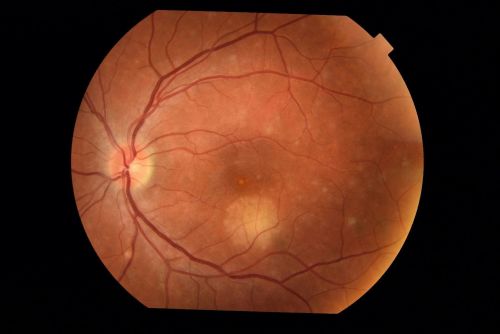Choroidal neovascularization (CNV) is a sight-threatening condition characterized by the abnormal growth of blood vessels beneath the retina. This pathological process can have devastating effects on vision and is a leading cause of vision loss in various retinal disorders.
The choroid is a highly vascular layer located between the retina and the sclera in the posterior segment of the eye. In CNV, new blood vessels from the choroid penetrate the Bruch’s membrane, a crucial layer separating the choroid from the retina. These abnormal vessels can leak fluid, blood, and lipid deposits, leading to retinal damage and visual impairment.
Choroidal neovascularization can occur due to various underlying conditions and risk factors, including:
- Age-Related Macular Degeneration (AMD): AMD is the most common cause of CNV. In the advanced form of AMD, known as neovascular or “wet” AMD, abnormal blood vessels grow beneath the retina, resulting in the formation of CNV.
- Pathologic Myopia: Severe nearsightedness or pathologic myopia can lead to CNV development. The elongation and thinning of the eyeball in this condition can disrupt the choroid and promote the growth of abnormal blood vessels.
- Inflammatory Eye Diseases: Inflammatory conditions, such as uveitis or ocular histoplasmosis, can trigger an immune response, leading to the formation of CNV.
- Trauma: Ocular trauma or injury can disrupt the choroid and promote the growth of abnormal blood vessels.
The symptoms of choroidal neovascularization can vary depending on the underlying condition. Common signs and symptoms may include:
- Blurred or distorted central vision.
- Dark or empty spots in the central vision.
- Difficulty reading or recognizing faces.
- Visual distortions, such as straight lines appearing wavy or crooked.
To diagnose CNV, ophthalmologists employ several diagnostic approaches, including:
- Dilated Eye Examination: The ophthalmologist examines the retina and optic nerve using specialized instruments to identify signs of CNV.
- Optical Coherence Tomography (OCT): OCT imaging provides high-resolution cross-sectional images of the retina, helping to detect and monitor the presence of CNV and assess the response to treatment.
- Fluorescein Angiography (FA): FA involves injecting a fluorescent dye into a patient’s arm, which travels through the bloodstream to the eye. Photographs are taken as the dye passes through the retinal vessels, helping to identify areas of abnormal blood vessel leakage.
Choroidal neovascularization requires prompt and targeted treatment to prevent further vision loss. The choice of treatment depends on the underlying cause, the extent of CNV, and the patient’s individual circumstances. Common treatment modalities include:
- Anti-VEGF Therapy: Intravitreal injections of anti-vascular endothelial growth factor (anti-VEGF) drugs, such as ranibizumab, aflibercept, or bevacizumab, are the standard of care for most cases of CNV. These drugs help inhibit the growth of abnormal blood vessels and reduce leakage, preserving and sometimes improving vision.
- Photodynamic Therapy (PDT): PDT involves the injection of a light-activated drug, followed by the application of laser light to the affected area. This treatment selectively destroys the abnormal blood vessels, limiting their growth and leakage.
- Laser Photocoagulation: Laser therapy can be used to target and seal leaking blood vessels in certain cases of CNV. However, this approach is less commonly employed today due to the potential risk of collateral retinal damage.
- Surgical Interventions: In advanced cases or when other treatment options are ineffective, surgical interventions, such as vitrectomy or submacular surgery, may be considered to remove or repair the abnormal blood vessels.
Choroidal neovascularization is a serious ocular condition that poses significant risks to vision. Early detection, accurate diagnosis, and appropriate treatment are crucial in managing CNV and minimizing visual impairment. With advancements in diagnostic techniques and the development of targeted therapies like anti-VEGF drugs, the prognosis for patients with CNV has improved significantly. Ongoing research and technological advancements hold promise for further enhancing our understanding and treatment of this complex ocular condition, offering hope to those affected by choroidal neovascularization.
If you need an appointment, please contact us at 03041119544 during our working hours or leave us a WhatsApp message at +923028291799 and someone will connect with you. Walk-in appointments are also available for emergencies. We can also be reached through our web portal on www.surgicaleyecenter.org


